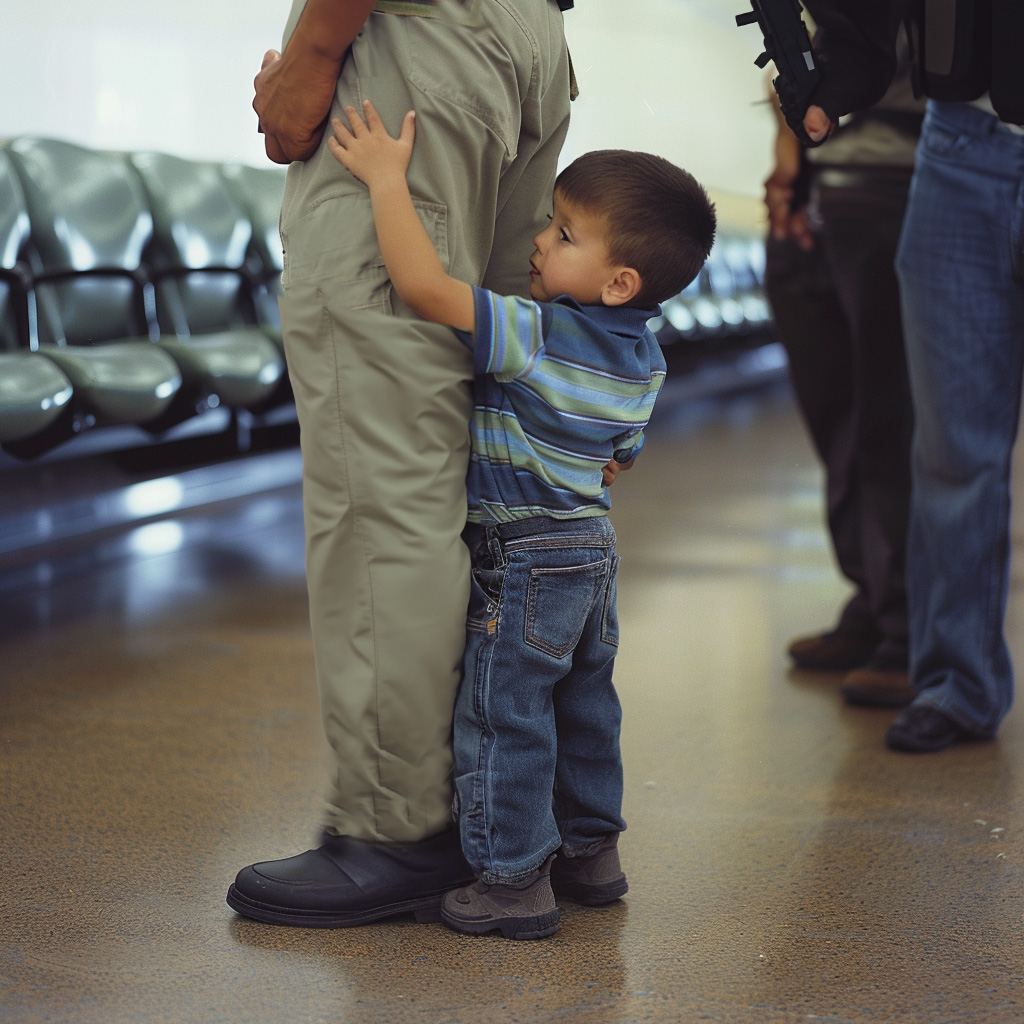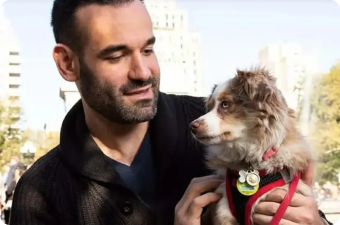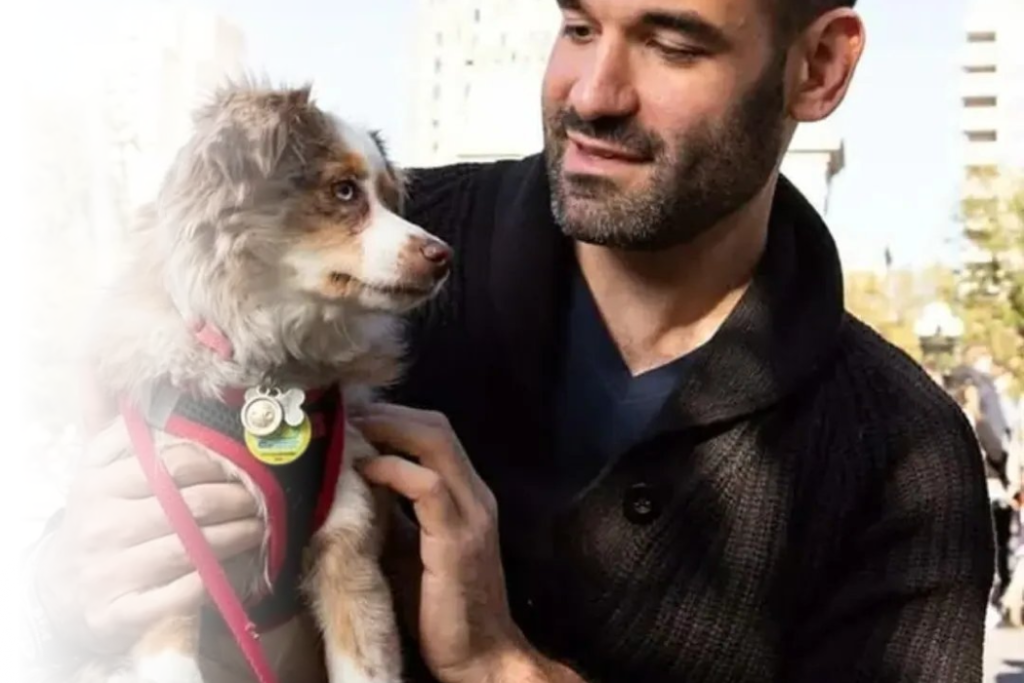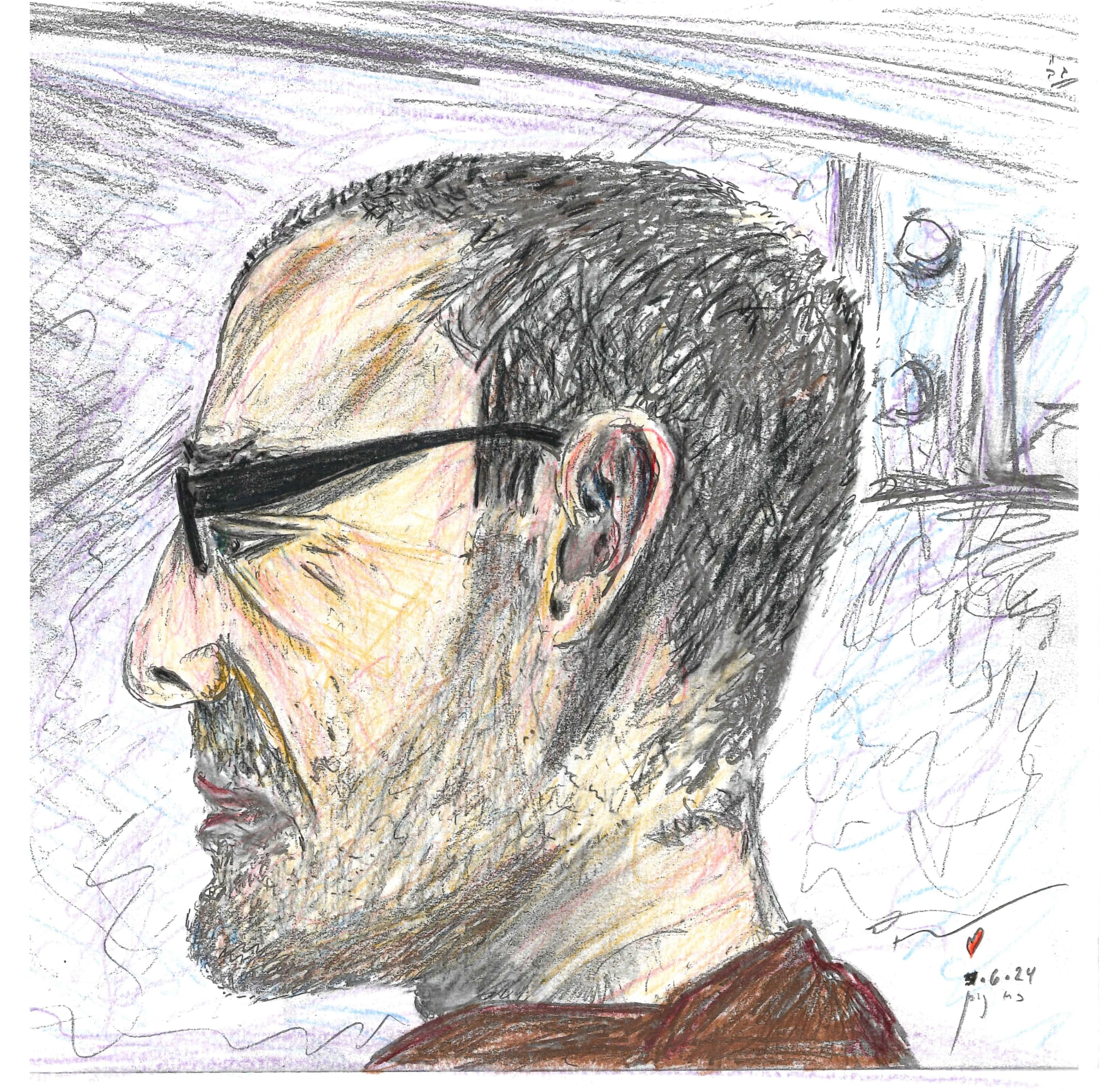One of the simultaneously most-painful and most-beautiful moments in prison is watching a small boy or girl cling to their father, grab him one last time, before visiting day hours are over. It may be the last time they see him for the week, or months if they live far away. You don’t want to cry in prison, but it’s difficult to hold it back.

Midjourney AI Generated Image
My tears were, largely, for the child my girlfriend and I gave up, which I later learned was driven by her fear that I would be imprisoned for years and she’d be left to raise him or her alone. I thought it was due to the morning sickness she was facing from an A/O blood-type mismatch, but she took a shot so that future babies wouldn’t cause her the extreme sickness and I took that as a sign we’d have more children together and said OK…
It was a huge mistake.
I have carried the death of that beautiful baby in the sonogram with me ever since, and I hear my muted voice crying out, “Elsie (name changed to protect her from embarrassment), please don’t kill our baby. I love you. I will love you forever.”
But I couldn’t get the words out, I didn’t have the confidence, the faith.
I don’t know how parents who lose a child they have held carry on — some days I have trouble with it and we never met, though I’m sure he or she was awesome.
It’s on me, and my lack of faith, my squandering of years of religious and spiritual education and training, my failure to be strong for the both of us, the three of us, when the young woman I loved so much was an emotional wreck of hormones, fear, shame (we weren’t married, though I offered and later we arranged for a license), and a turbulent sea of other emotions. The nurse in Melbourne pressured her, too, while she was held in quarantine during the pandemic. It wasn’t fair to her at all.
I am often hit with a wall of overwhelming responsibility. Had I simply told my girlfriend how much I loved her, how I loved her more and more every single day, and in new ways, I would be bouncing my little baby up and down, helping him or her touch the ceiling like other dads, watching his mom chase him around the room (I will assume for the rest of this essay that it was a boy, but a little girl just like her mom would be super cool and sassy, too.).
In the most-recent Parsha we learn that Yaakov failed to let his wife Leah feel loved, and that she had children in the hope he would love her. Leah named her first son “Reuben”, Hebrew for “Look, a son”, with the hope it would make Yaakov love her. But he still failed to express love for her and Rabbi Sacks explains that this ate at Reuben’s confidence to the point he could not speak up even when he knew his thoughts were right and moral — resulting in the brothers throwing Joseph in a pit, him being picked up by Midianites (as the Shadal, Rabbi S.D. Luzzato, from Trieste, Italy, explains, the “whole world thinks the brothers sold Joseph, but it was passing Midianites” who spotted him in the pit — the brothers, supposedly regretted their decision and went to save him, not sell him) and sold to Ishmaelites, and then brought to Egypt, starting the journey of the Jewish people into hundreds of years of slavery.
Reuben went to save Joseph, but it was too late. His voice, unexpressed due to a lack of confidence, to feeling unloved, unwanted and rejected, stayed locked inside his heart, and so much suffering resulted.
This, perhaps, hits home for me more than anything. During the years fighting this case, I often put on an air confidence, but in reality struggled to feel loved, to feel wanted — a lifelong battle (not at all due to my parents, who were and are so loving). I didn’t understand my girlfriend’s need to be with family during such an emotional time was not a reflection on her lack of love for me. Worse, I allowed my fears and self-doubts to manifest as a victim mentality, I became infantilized and dependent, failing to control my emotions, falling into downward spirals.
Ultimately, this all came down to a lack of faith. G-d put us together, G-d gave us that beautiful child, G-d would help things work out for the best.
I forgot that. I forgot G-d. I forgot my faith, and I and my girlfriend and our child suffered immeasurably.
A soul is here for a limited time, and only G-d sets that time. I could not have made that child stay here longer, but it did not have to be my weakness, my failure to tend to my girlfriend’s need for reassurance, love, and support that was the reason.
Everything happens for a reason, and G-d determined that we would learn this lesson, and we would carry this burden — hopefully and surely ultimately for good, ultimately to find faith, face and heal our personal wounds, and help others, too — but it is still incredibly painful.
I cannot imagine a parent losing a child they’ve held.
I cannot imagine what Elsie went through and goes through, and am deeply sad and sorry for the pain I caused.
For those who have even this slightest awareness of the pain of such a loss, it should motivate us to help fathers and mothers not be separated from children, and for children not to grow up away from their parents.
In the Torah, Parsha Mishpatim (Exodus), we learn a thief works up to 6 years to pay off the debt, is kept WITH their family, and is freed and given resources to stand on their own feet. There is no permanent record, no “Scarlet letter”. Those who wish to remain as slaves are threatened to have their ear nailed to the door, as a deterrent from choosing that route. G-d wants you to stand on your own two feet — to believe in yourself and your ability to make it without such dependency on a human master.
In the Torah, there is no torturing children, wives, families, or the offender as part of a “payment” for crime.
That should not be the punishment in modern society either.
As in the Torah, men who are not imminently dangerous should not be caged, their families should remain intact, a source of motivate to get and stay on their own feet, to get and stay clean, to create and contribute rather than destroy.
Today I watched a little boy grab at his father over and over for one last hug, one more last hug, one more being held, one more on the ground… and I felt so sad for that little child, and for mine.
Express your love. More than you think you might need. More than you’re comfortable doing. In every way you can… with words, flowers, gifts, cards, acts of kindness, hugs, trips, poems… do one extra. Add something new.
And do it for yourself, because you never know when that voice inside you, that part of you which needs to express itself, will feel insecure, unlovable, or afraid, and that extra bit of love you gave yourself is what will free that voice.
I asked myself, as I began writing, “Did Reuben redeem himself?”
In part, certainly yes, he came down and helped make peace with his brother Yosef. He and his brothers defended Yosef’s younger brother, Rachel’s only other son.
Rabbi Yehoshua Bin Nun of Alon Shvut (Gush) has a fantastic lesson. He asks, “Why didn’t Yosef send a message home to his father Yaakov (aka Israel) that he was alive? Yosef was the viceroy of the Pharaoh, resources were no issue. Why leave his father mourning him when he was really alive?”
Rabbi Bin Nun answers that in the plain text of the Torah, the “Pshat”, Yaakov instructed Yosef to “See to the peace (Shalom) of your brothers” (Exodus 37:14). Yosef was a “shliach”, a messenger of his father, to make peace with his brothers, so he did not return to his father until he completed that mission and ensured all 12 brothers were at peace, including Reuben.
Then it hit me. It doesn’t matter if Reuben redeemed himself, because I am not Reuben, and you are not Reuben, and Elsie is not Reuben.
But nor is Reuben Reuben! When Reuben showed up physically, not just in thought or words, he was no longer the Reuben who couldn’t express his beliefs, who couldn’t act in the way he knew to be right.
I am no longer the Ari who could not get the words out of his heart, out of his soul. Surely, I am human and I may fail at some point. There are times where it is not easy to decide if I should share something (tough to believe, I know!), and certainly it’s difficult to know exactly how… this topic, for sure, is a difficult one, and I have changed the name of my girlfriend (ex) because it may be that I need to tell the story but that she still needs to keep it secret… It’s not for me to make that decision for her (though I messed up when sick, I don’t want to repeat that mistake).
We are not the acts or omissions we made yesterday. We are not the person we were the minute after we decide to change.
In the same Mishpatim I referenced above, right after the laws on the man who steals going free, we have a strange instruction, to help lift your enemy’s donkey if you see it’s fallen under its burden. I have shared this many times, because it’s one of my favorite lessons. Rabbi Telushkin teaches the Sages ask, “Why does it specify ‘your enemy’s’ donkey, when surely you must help any animal fallen under a burden?”
The answer is that when you help your “enemy” lift their burden, you will realize they are not an “enemy”, a label, but a person who is overwhelmed by a heavy load. By working together you encounter each other’s humanity.
Today, in visiting day, I understood how the guards here are so good at maintaining their humanity and being kind to the men (for the most part, they really are). When they help a father see his child, a husband see his wife, they are helping a man lift an incredible burden. They see not an “inmate”, not a “thief” or “drug dealer” or any act, but a human being, a man.
What word does the Torah use to describe Yaakov wrestling G-d in last week’s Parsha before he faces his “enemy” brother Esav? “Ish”, man. When you look into a man’s heart, you see G-d. You see infinity. We are not one thing, we are infinite, made in the “image of G-d”.
With this, we can forgive ourselves, and we can forgive others. We can accept responsibility for the harm we have caused, and we can know that it is possible to never hurt that person that way again, and for them to not hurt us. We can truly forgive.
And, in doing so, we can truly love. Today I saw my friends lift their small children and hug their wives and girlfriends and brothers and friends. Today I got to hug two of my dear friends, and to talk with them for a long time. I got to see their humanity, I got to experience G-d.
We are coming up to Chanukah, and I am reminded of my favorite section of the Rambam’s Mishna Torah (I’ve only read about half, to be fair). The Rambam giving the laws on Chanukah teaches: If a family is poor and they have only enough money for one candle, and it’s Shabbat night, Shabbat and Chanukah, they should use the candle for Shabbat, for the inside of the home, and not for the Chanukah menorah on the outside of the home (to “publicize the miracle”), because the candle inside the home is to prevent family members from bumping-into one another and to enable them to have Shabbat dinner together, it is to maintain the peace in the home. The Rambam rarely gives the “reason” behind a Mitzvah, but here he ends strong, adding, “Because the entire Torah was given for the purpose of establishing peace, as it says ‘His ways are ways of peace…”
The Torah itself answers whether Reuben redeems himself in Vayigash (Spoiler alert!), when after the brothers refuse to let Yosef arrest Binyamin, his younger brother, to spare Yaakov the pain of losing his only remaining son from Rachel, Yosef reveals himself and says, “do not be distressed, nor reproach yourselves for having sold me here, for it was to be a provider that G-d sent me ahead of you. For this has been two of the hundred years in the midst of the land and there are five more… Thus G-d sent me ahead of you to insure your survival in the land and to sustain you for a momentous deliverance. And now: it was not you who sent me here, but God.”
in his being the favorite child clueless to his brothers’ pain. Yosef and his brothers mature, they become men, they forgive, they change. Yosef realizes that everything that happens to us is by G-d, and that it is all “for” us, not “to” us.
A friend asked if when I ultimately win my case, please G-d, I will seek “vengeance”. No. Because G-d would have put me here anyway. G-d would have given me these “growing pains” regardless of which people were designated to deliver them.
Because of these trials, I feel confident, with faith in G-d and myself, that I can be a “provider”, a great father, a better example for my children, a source of love, confidence, and faith for my loved ones and friends.
~
Love, Rabbi Telushkin writes, is an investment the future. He quotes Talmud Sotah (49a): “The love of parents goes to their children, but the love of these children goes to their children.”
The extraordinary love Yaakov gave to Yosef ultimately benefitted all his sons.
Yaakov redeemed himself by sending Yosef to see to the “peace” of his brothers from his very-human habit of showing favoritism and failing to express love as Leah and her children needed.
To be fair, we will all fail to express love as those close to us need at times. I remember a father who would paint pictures of his daughter’s beloved cat, but she was an auditory more than a visual person and would have prefered to simply hear him say, “I love you.” His way of loving, showing it, was not her way, hearing it, and it didn’t resonate with her. She found it difficult to feel his love, even though he clearly loved her (and her cat, more than he’d admit!).
This is why it is important to invest in understanding deeply the attachment styles and modes of expression and learning of those we care about, and to err on the side of expressing our love in a variety of ways. Sometimes a hug is more powerful than flowers, and for others the opposite may be true. For others, a poem, a song, a whisper… but the most important thing is to be careful to help others and ourselves *feel* loved, and to check-in frequently to be sure.
We cannot undo our mistakes, but we can turn them from darkness into light. We can see our trials and pains as gifts from G-d, lessons to bring us to another level, to make us stronger, more grateful, calmer, more loving and attentive…
In fact, G-d wants this. As I wrote last, G-d does not want perfect people. There are no saints in Judaism.
Perfection is the realm of the angels, not humans. We are the only creatures with Free Will. That means we confront darkness, we wrestle with painful decisions, mistakes, hurt, and we ultimately realize that it is for good.
That it happened “for” us, not “to” us.
This is redemption. It is the “ultimate form of worship,” Zater says.
The Talmud agrees, saying, “In the place where a repentant sinner stands, a thoroughly righteous person is not entitled to stand,” (Berachot 34b)(Also quoted in Jewish Wisdom, P. 384 — a fantastic book!).
Even more so, the Talmud says, “A fast in which no Jewish sinners participate is no fast”! (Kritot 6B).
Those of us blessed to have friends who have beat addiction, and who beat it daily, who have turned-away from violence or crime or hate, who are working to beat a bad habit, know that these are truly great people, truly G-d’s children.
Perfection is easy (literally, it’s fantasy or delusion), confronting our pains and fears and hurt parts, “wrestling”
with our fears and doubts, and finding faith is hard.
Forgiveness is hard, until it’s not.
Faith is hard, until it’s not.
Love is hard, until it’s not.
And all of these are cycles. There are times they will be difficult again.
And that is where love comes in.
Because each time it gets easier. Each time we have our pass lessons to lean on. Each time our faith gets stronger.
Each time our love shines brighter and more powerfully.
King Solomon (Shlomo) wrote, “Many waters cannot quench love, neither can floods drown it.” (Song of Songs 8:7)
Loss, heartbreak, failure, regret, betrayal, fear, a worry that we are “not enough” …these are powerful feelings to confront, but, King Shlomo tells us there, love overcomes. Love shows us that we are infinate, that we are truly Children of G-d.
G-d sends us into the darkness knowing we can find the light, that is has always been there inside us, and bring this realization to others. Rather than be ashamed, rather than become weak and dependent, we can be providers.
Rather than fall for delusion of human perfection, a cop-out of epic proportions and a guaranteed recipe for insecurity and failure, the Torah teaches us to accept and love ourselves regardless of our past mistakes, and to confront them and repair those parts of ourselves which led us to those decisions or accidents. And to do this for others. To “love others as we must love ourselves.” (Leviticus)
We must lift ourselves up, so that we can help others lift themselves. (Every. Single. Day. :))
On that note, a special thanks to my dear friends Marc, David, David, Oriah, Jared and Griselle who made the trek out to visit with me today, and thank you to Mark and my father for working behind the scenes to make it happen from overseas.
Thank you endlessly to Lyli for being there for me during times the burden was too heavy to lift, or certainly felt that way, and for taking care of Tzahala. You are angel sent to our lives.
Thank you to all my friends for their kind words, letters, emails, books, and messages of kindness and love. (I know you’re using ChatGPT to write those letters, Avrumy, so please thank the robot for me!)
“Woe to him who is alone and falls with no companion to raise him,” Ecclesiastes (Kohelet) 4:10.
I am so grateful to not be alone, and because of your help, I feel so loved and happy to be where I am in life (but please G-d let me leave this place and go home!)
~~~ With love,
Ari
—————
Group Message. Draft 1.0 Some Torah/source quotes may be off as they are from memory. Check sources.
You may share this message.


